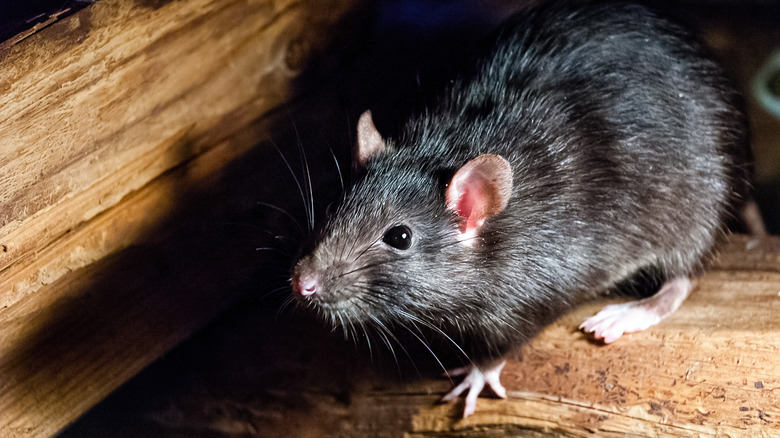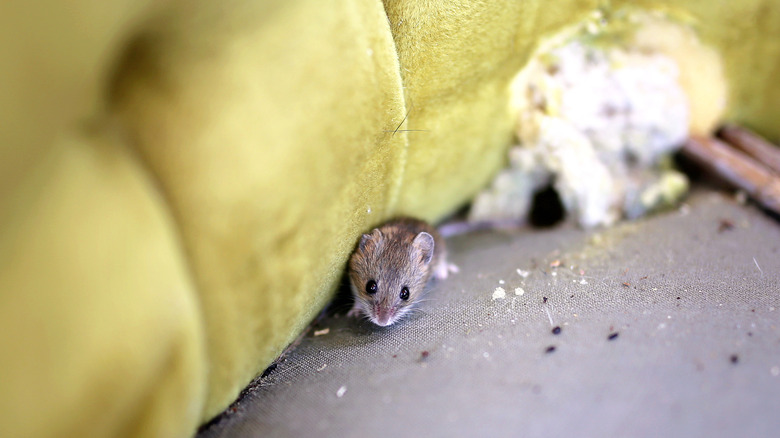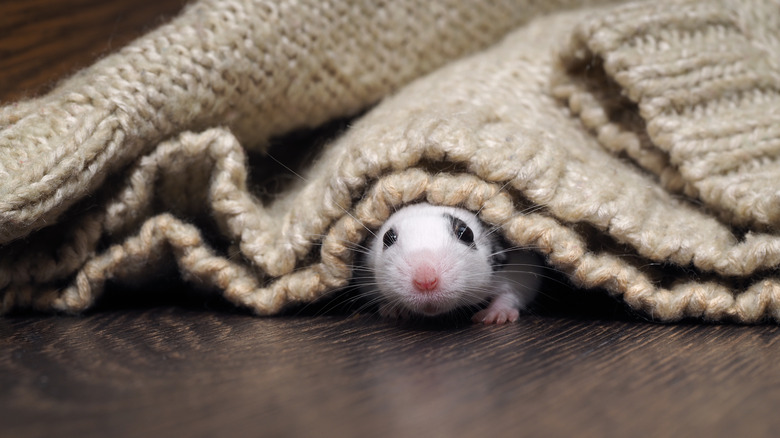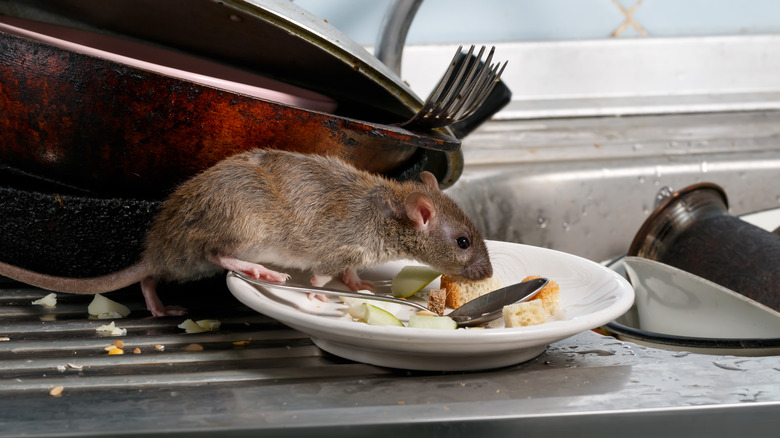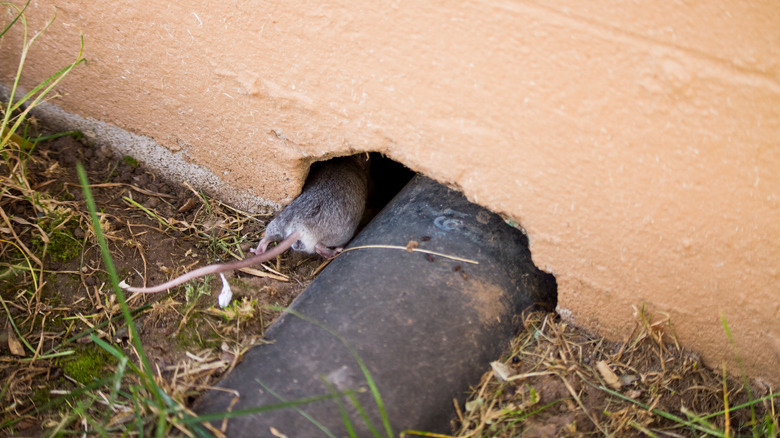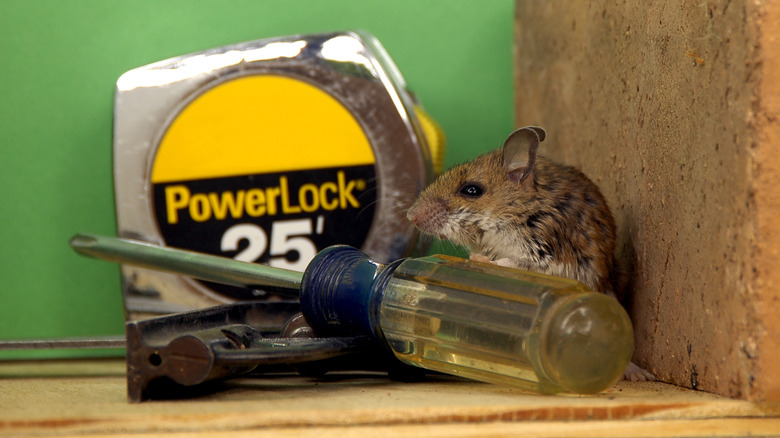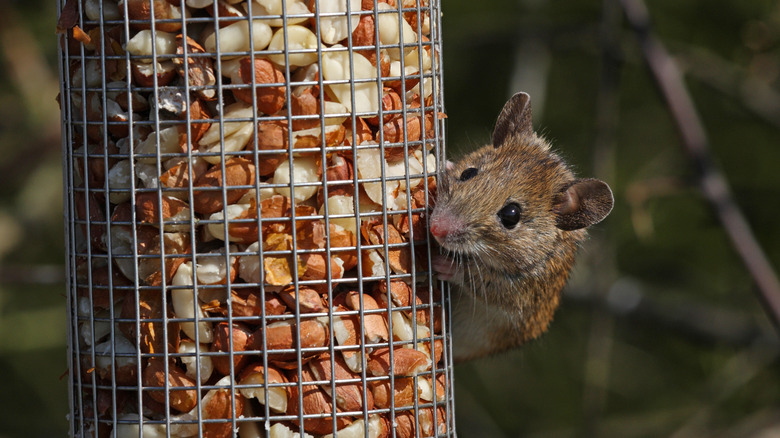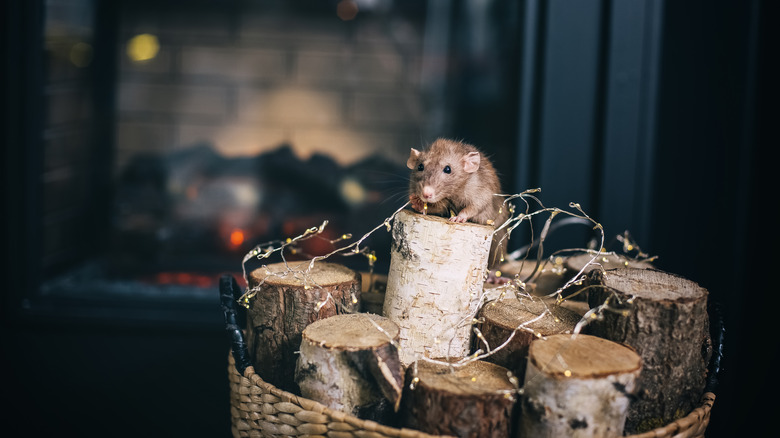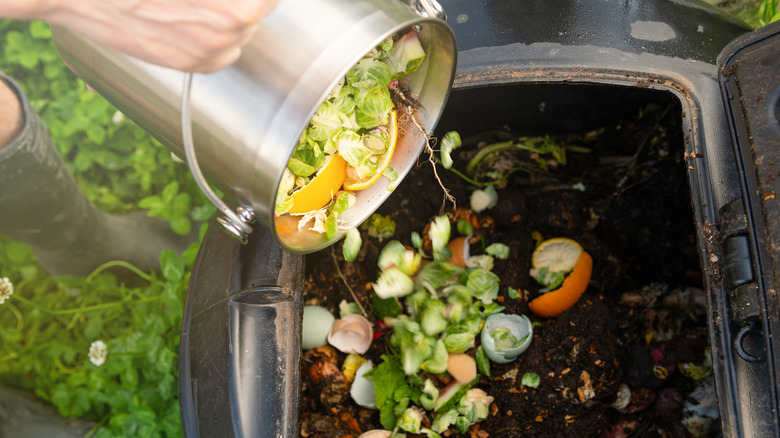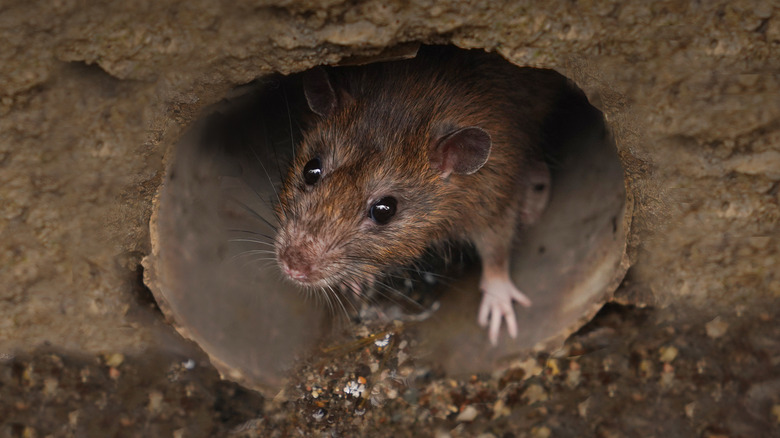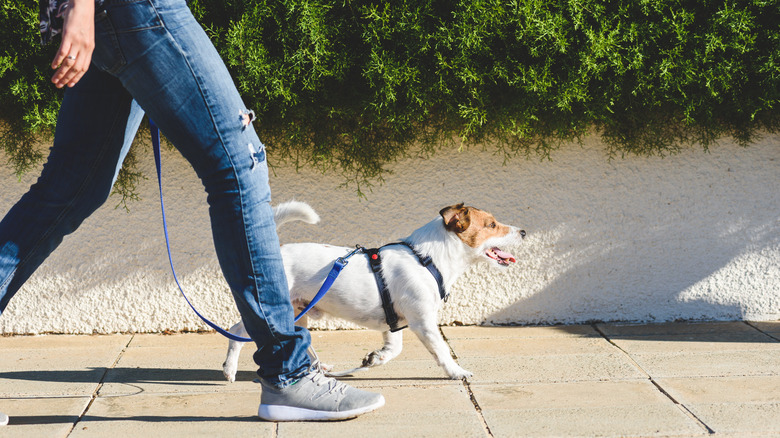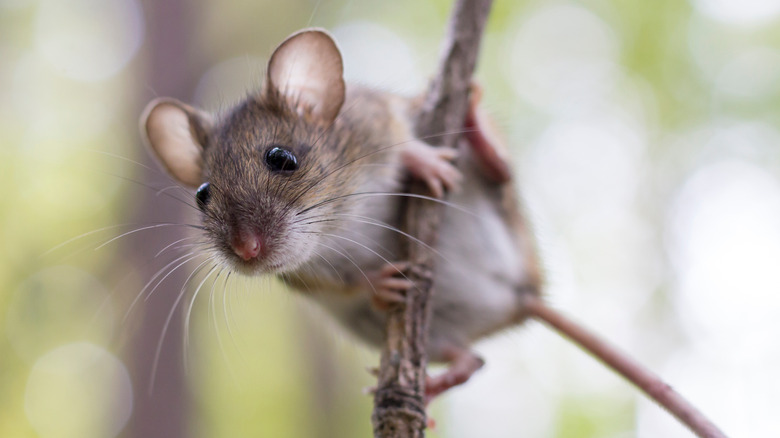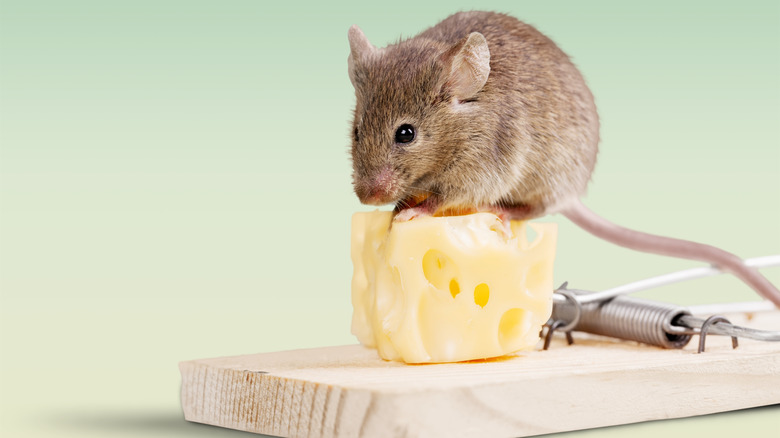The Real Reasons Why You're Having A Pesky Rodent Problem
Chances are, you've had to deal with rodents at some point in your life. Mice, rats, and other critters make their way into approximately 21 million homes in the United States each winter, according to Pest World — and they can cause quite a fright. "Something I've noted over the years is that you know someone has a mouse when you hear the very distinct scream the person makes when they've seen a mouse," says Michelle Niedermeier of Pennsylvania State University, who works with the Pennsylvania Integrated Pest Management Program (per Popular Science). "Male, female, old, young — it's the same screech."
Beyond the fear factor that rodents bring, however, they can also be a serious concern for our physical well-being. "Mice are a health concern. They spread disease, they trigger asthma, and so having a mouse in your house is a real health issue," says Niedermeier. What's more, spotting one mouse or rat is likely just the tip of the iceberg, and once you have a rodent problem, it's tricky to solve it. So, if you're a little puzzled as to why you're facing a rodent issue, we've got the real reasons — as well as how to rectify them.
How do I know if I have a rodent problem?
Identifying a rodent problem may not be as simple as seeing the odd mouse scurrying by now and again. You might be able to smell a rodent infestation before you even see one if you start to notice a musky, pungent stench in your home that you haven't before, according to Breda Pest Management. The smell is largely due to the droppings and urine that mice or rats leave in their wake (which is why noticing fresh droppings is another tell-tale sign) as well as the unfortunate smell of rodents that have died.
In addition to smells, gnawed-on food packages can be a sign of rodents as well as gnaw marks on furniture or your home's structure. The fresher these are, the lighter in color they'll be, as The Spruce points out. Nests built out of trash or fabric around your home or track marks on floors or countertops can also be giveaways. If you suspect a rodent problem, a good way to find out for sure is to leave a thin layer of baby powder or flour in the area, and check it for any trails regularly.
It could be due to the warmth of your house
As the temperatures drop, your home will become more attractive to rodents. That's why mouse or rat infestations can become particularly prevalent during the fall and winter months as the animals seek out a warm spot to nest in the winter, according to Griffin Pest. This is also due to fewer food sources available in the wild during the winter, like seeds or grass, leading them to look for their meals increasingly from human sources, as Terminix points out. Because mice and rats don't hibernate, all of this can lead to real problems when it's cold.
To solve the issue without plunging your house into freezing temperatures, try as much as possible to minimize rodent access by identifying any access points to your home. Find any gaps in windows and doors or cracks in the foundation, and seal off as many as possible.
Your rodent problem could be due to sanitation issues
When things get a little dirty around the house, mice and rats thrive. Aside from the other health risks involved with poor sanitation, if you're leaving things unclean, particularly in the kitchen, it's an open invitation for rodents to come and chow down, per Breda Pest Management. Once rodents identify your home as a place where they can eat and drink freely, it can snowball.
Nip this in the bud by staying on top of your cleanliness around the home, especially in any eating or food prep areas. Sweep your floors regularly, and keep a particular eye on areas carrying food waste that could be easy to miss, like under the toaster or on the floor next to your oven or trash bin, according to Terminix. Keeping your garbage cans and food packages tightly sealed is a must, too, so they don't attract pests.
Rodent entry points are smaller than you'd think
Open entry points to your home will act as a front door for rodents. Gaps under exterior doors, between windows, and any holes and cracks in your home can all be ways that rats and mice enter. For mice, in particular, the size of the holes they can squeeze through is pretty surprising. "If you can stick a regular old pencil in a hole, a mouse can get through. If their head can get through, the rest of their body can get through as well," says Michelle Niedermeier of Pennsylvania State University, who works with the Pennsylvania Integrated Pest Management Program, (per Popular Science).
If you suspect this is the case in your home, tackle it head-on. Add a barrier or a door sweep to any doors leading to outdoor spaces. Then, block any holes or gaps you notice around the home — paying particular attention to any holes around wiring or pipes — using long-lasting materials like copper mesh or silicone caulk. "You really only want to do this job once," as Niedermeier says, so be thorough.
An attached garage could be part of the problem
An attached garage can be convenient for easy access for your home — but not just for the humans who live there. As garage doors are generally much less tightly secured than other doors around the home, they can be easy entry points for rodents, as the Indiana Department of Health states. And, as soon as they've entered the garage, getting into your main home is a cinch.
As with your home, block off any entry points for mice or rats in and around your garage, suggests Terminix. It's also worth thinking about what you're storing in your garage and how: If you keep birdfeed or pet food in there, leaving any containers open or loosely sealed can attract rodents. Keeping full trash bags in the garage can also lure rodents in, so try to store them elsewhere or get rid of them regularly. But, if you have no other alternative, keep your trash well-sealed in a container that rats or mice can't gnaw into.
Your bird feeder could be the cause of your rodent problem
Birds aren't the only animals that will enjoy your bird feeder. Their pecking can leave seeds and birdfeed on the ground that then become an open buffet for rodents, according to Victor Pest. And, once they're in the vicinity, their next stop is likely inside your home.
Keeping the area around your bird feeder clean is a good place to start to tackle this: Clean up any dropped seeds, and if the feeder is hanging over a grassy area, mow it regularly to keep it short so that mice can't use the blades as cover. Using a metal pole to hang the feeder instead of a wooden one can make it harder for rodents to climb, according to The Spruce. It's also worth thinking about where you place your feeder: A position closer to your home will increase the likelihood that pests will then seek out an entrance. One neat trick for deterring mice is to mix a little cayenne pepper into your bird feed. The birds won't mind eating it, but the mice certainly will, keeping them away.
Your pile of firewood could be contributing to the issue
For many, a pile of firewood is essential during the colder months, but these piles can be a pretty convenient place for rodents to lay their heads and nest. In particular, placing a firewood pile inside gives mice a warm, dry place to hide, sheltered from the elements, according to Modern Pest.
The solution, while not ideal, is to keep your firewood outside and ideally a fair distance away from your home. Stacking them against your house's exterior walls can give rodents easy access inside through a crack or opening. Keeping your firewood elevated from the ground, while also useful to keep it dry for burning, will make it harder for rodents to access. Finally, make sure you're not inadvertently smuggling mice into your home by bringing in big stacks of firewood without checking them first. Save the rodents the free taxi ride, and just bring in what you need for burning.
Dog or cat food readily attracts rodents
It's not just human food that mice and rats enjoy. Anything that your pets eat will be on the menu for rodents, and uncovered or unsealed dog or cat food can be a real draw for them, according to the Indiana Department of Health. Feeding your pets outside can be particularly attractive to rodents, and if you're leaving your dog or cat bowl out overnight, you're essentially presenting these nocturnal critters a free meal.
Instead, try to feed your pets indoors, and if you have to feed them outside, make sure to do so away from exterior walls, if possible. Remove their food and water bowls, and take them inside promptly (and well before dark), and clean up any bits of food left. It's also crucial to seal your unused pet food just as tightly as you would your own food, wherever you keep it, as Victor Pest suggests.
Your rodent problem could be due to your compost heap
Considering it's essentially a big pile of leftover food, it's little wonder that rodents will love your compost heap. Luckily, there are a few solutions to deter them from taking up residence among your old orange peels. If you're so inclined, it's possible to rodent-proof your compost heap by installing mesh to guard it, as Compost Magazine points out. However, you'll have to make sure it's very well-secured, as mice, in particular, can squeeze through small holes. You can also buy an enclosed compost bin to keep them out.
A slightly simpler solution, however, is to keep your compost heap moist by flooding it with a hose now and again, according to Garden Organic. Doing this can force the rodents to seek out drier accommodations. Turning your compost regularly will also deter mice or rats from nesting in the heap, and trying to bury food deeper in the heap instead of leaving it on top will make it less accessible — and less attractive — to rodent visitors.
Leaky plumbing could lead to a rodent infestation
Mice and rats need to stay hydrated like the rest of us, and any water or plumbing leaks you have in or around your home can attract them, according to Griffin Pest. Dripping faucets, loose pipes and joints, or worn-down pipes can all be sources of leaks, and hidden leaks can be particularly troublesome, as the rodents are getting water from a source you can't even see.
A good indicator of hidden leaks could be your water bill rising without any obvious reason, notes Griffin Pet. Once you've identified the problem, fix the leak or call in a plumber to stem the flow and reduce water sources for pests. Keeping an eye on other water sources — like standing water in gutters, pools, hot tubs, birdbaths, ponds, leaky or still-running hoses, and even puddles — is also important, as the Indiana Department of Health points out. While mice can generally survive on the water they get from food, rats will be especially attracted to water sources as they need around an ounce a day to survive.
Make sure you're cleaning up after your dog
You might wanna brace your stomach for this one: Your dog's poop is a big draw for rodents. Not only do they like it, but "dog waste is often a leading food source for rats in urban areas," according to Jacob D'Aniello, founder and president of DoodyCalls, a national pet waste and removal company (via Chewy). It contains the proteins, carbohydrates, fats, and minerals that rats need and is generally safe for them to eat. So, if it's available, rodents will be attracted.
While you might think that your dog's poop is okay to leave in your yard as no one will step on it, make sure you remove it daily, suggests the Indiana Department of Health. When you dispose of it, ensure it's well-sealed and in a trash can with a heavy lid — as much for your nose as for keeping the rats away.
Rodents can access your home via nearby trees
You might not believe that mice can "Mission Impossible" their way into your homes, but, if you have a tree nearby, you're posing the challenge to them. Not only will mice often live in the hollows of trees, but they're also good climbers, able to scale the bark of trees easily, according to Orkin. From there, they can easily climb across any branches that might hang over or close to your home and then jump onto your roof, making their way into your attic or your home through exterior entry points.
To reduce the risk of this, trim back any branches that come close to your roof or home. Mice often make themselves known in your attic through tell-tale scratching sounds from above, but the warning signs of rodents that apply anywhere in your home — like droppings, urine trails, or nests — also apply here, according to Terminix. Mice might also burrow into your insulation and make homes or tunnels in it, so keep an eye out for those signs, too.
You might not be sealing your garbage properly
Keeping your garbage open is not only a surefire way to stink up your home, but it's also pretty inviting to rodents due to the food remnants you're discarding. Even if your trash is sealed in a bag, rodents' sharp teeth can make short work of getting inside, and you could end up with both a rodent infestation and a total mess on your hands, as Breda Pest Management says.
For the garbage inside your home, keep your trash bags in a sealed can or container. This stops pests from getting into the trash and minimizes smells that will lure rodents. A metal or thick plastic can with a secure lid is ideal, according to the CDC. Make sure to take out the trash regularly, and try not to skip any garbage collection days to make sure the trash stays outside your home as long as possible. Also, keep your exterior garbage cans away from your home.
So how do I get rid of the rodents inside my house?
Try as we might to cover all our bases to keep rodents away, they might still make their way into our homes. So how do we get rid of them once they're inside? While maintaining good sanitation and sealing entrances off is key, using traps is also a good (if unpleasant) way to rid your house of mice and rats, according to Popular Science. Simple wooden and plastic traps work well; humane traps are also widely available.
What's not advisable is using glue traps, due to their inconsistency and potential for further suffering. "The glue, though it's sticky, is not sticky enough ... They are ready, willing, and able to gnaw off their own arm to get out of it. It's more humane to use a snap trap," says Michelle Niedermeier of Pennsylvania State University, who works with the Pennsylvania Integrated Pest Management Program (per Popular Science). Using poison can also not only risk the safety of non-rodent animals (and humans) but can also make disposal afterward difficult. When cleaning up after rodents, be sure to follow stringent hygiene measures, as the CDC suggests.
